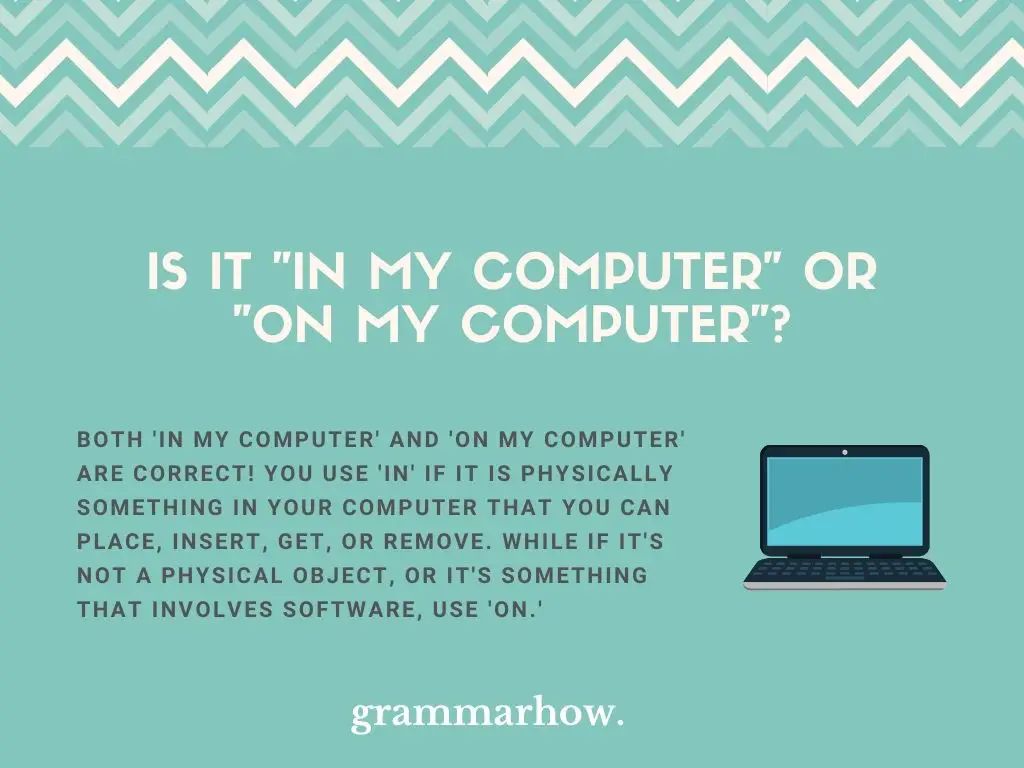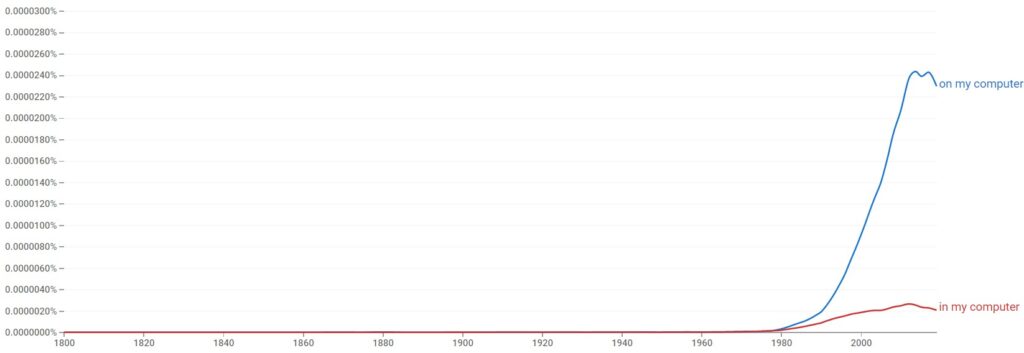Even for native English speakers, prepositions can be such a headache. Determining whether it should be at, on, in, of, by, from (and so many others) is just so confusing. But, lucky for you, we’re here to make things easy and a lot more understandable. Say no more to preposition troubles!
Is It “In My Computer” Or “On My Computer”?
Both ‘in my computer’ and ‘on my computer’ are correct! You use ‘in’ if it is physically something in your computer that you can place, insert, get, or remove. While if it’s not a physical object, or it’s something that involves software, use ‘on.’

Though this can get confusing along the way, it’s most understandable through an example. For example, you say that your USB is in your computer because it’s physically in your computer, and you can remove it or plug it in again. But, you say that you are downloading a movie on your computer, as it involves software or something that you cannot physically get or even get in. It just appears on your screen. Let’s try to elaborate further.
What Does “In My Computer” Mean?
‘In’ is a preposition of place that usually describes the location of an object being inside something. In this case, using ‘in’ refers to things inside the computer. It usually refers to hardware, items you can physically touch, get, or retrieve.
In literal terms, you cannot use ‘in’ for non-physical situations because ‘in’ means inside. With non-physical things, it is impossible to touch digital files and apps, nor is it possible to physically retrieve or remove them from the computer. You can’t reach into your computer to get whatever digital file was inside.
Examples Of How To Use “In My Computer” In A Sentence
- The motherboard in my computer got broken.
- I plugged your USB in(to) my computer, and luckily it was virus-free.
- I hid the piece of paper in my computer.
- The water got in my computer, but it was working fine afterward.
- The technician replaced the faulty wire in my computer.
As we can see in the examples above, motherboard, USB, paper, water, and wire are all physical objects that have physical representation and can be felt or touched. Using the preposition ‘in,’ we describe the physical location of these objects: inside the computer.
However, there are a few exceptions to this rule. Take a look at the following sentence:
The Documents folder is in the C:\Users\Admin\Documents directory on my computer.
Here, we see that ‘in’ was used for a non-physical object. The documents folder is a digital folder found on the computer. However, in the sentence, we described the specific location of the folder. It tells us that the documents folder is inside the said directory. Thus, ‘in’ is still used despite the folder having no physical representation because it is still inside the said directory.
Looking at this, let’s now know the meaning of ‘on my computer.’
What Does “On My Computer” Mean?
‘On’ is a preposition of position usually indicating that something is on the surface or is resting upon something else. We use ‘On my computer’ when about software and digital files or programs.
Opposite to ‘in,’ we use ‘on’ for objects that are not physical or cannot be touched and retrieved. You can’t reach into the computer to pull out or get the digital files and software. It encodes on your computer, and it just appears on your screen. Thus, we use the preposition ‘on’ for objects with non-physical representation. Let’s look at some examples.
Examples Of How To Use “On My Computer” In A Sentence
- I downloaded the movie on my computer.
- I was transferring essential files on my computer a while ago.
- I installed a new game on my computer, and I enjoyed it.
- I can’t seem to revise the settings on my computer.
- I’ll be having a meeting on my computer.
In the examples above, we can see that the movie, the files, the game, the settings, and the meeting are all things that don’t have a physical representation. They only appear on the screen, and you cannot physically get them. Thus, we use the preposition ‘on.’
Now, let’s check the sentence from a while ago:
The Documents folder is in the C:\Users\Admin\Documents directory on my computer.
As explained previously, we use ‘in’ for the directory because it is a specific location. However, since this directory is non-physical, we use ‘on’ to describe the given address as ‘on’ the computer, as a digital directory.
Is “In My Computer” Or “On My Computer” Used The Most?
Checking the Google Ngram Viewer, we can see in the graph that the phrase ‘on my computer is used more often than ‘in my computer.’ I believe it’s because we talk more often about files, and programs, rather than hardware.

People talk about documents, programs, video games, or apps that all revolve around the digital aspect of the computer. Thus, we use ‘on’ for these topics.
There’s also the presence of this sentence:
I am on my computer.
Though you are not necessarily on top or the surface of your computer, we usually interpret this sentence as having a hidden word: I am (working) on my laptop. In the same way, you cannot use ‘in’ as you are not working inside the computer but working with or on it. We use this sentence often, which can be part of the reasons why “on my computer” has a higher percentage than “in my computer.”
Which Other Prepositions Can Be Used With “Computer”?
Prepositions are not limited to ‘in’ and ‘on.’ There are many other prepositions we can use to convey messages with different meanings. There’s ‘with,’ ‘from,’ ‘by,’ and ‘at,’ among others.
With my computer
‘With’ is a preposition that means in the company or presence of something, carrying or having something, or even using something.
We can use it in a sentence like this:
- I shared the presentation with my computer.
Meaning: I used my computer to share the presentation.
From my computer
‘From’ is a preposition that shows the origin of something or who sent or gave something.
* We can use it in a sentence like this:
- I transferred the file from my computer to yours.
Meaning: Originally, the file was on my computer, and I transferred it to your computer.
By my computer
‘By’ is a preposition of place that usually means the object is close to, near, or beside something.
We can use it in a sentence like this:
- I left my journal by my computer upstairs.
Meaning: My journal is near my computer upstairs.
At my computer
‘At’ is a preposition that shows where something is, where something happens, or an object in a direction towards something.
We can use it in a sentence like this:
- I’ve been staring at my computer for hours.
Meaning: I’ve been staring towards the computer. Or, I have been directing my eyes to the computer for hours.
You may also like:
“Install In” Or “Install On” – Easy Preposition Guide
“In The System” Or “On The System” – Easy Preposition Guide

Martin holds a Master’s degree in Finance and International Business. He has six years of experience in professional communication with clients, executives, and colleagues. Furthermore, he has teaching experience from Aarhus University. Martin has been featured as an expert in communication and teaching on Forbes and Shopify. Read more about Martin here.
